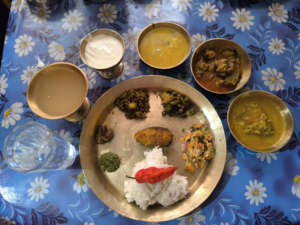IBS and Assamese Diet: A Path to a Healthy Lifestyle

Introduction: Understanding IBS and Its Impact
Irritable Bowel Syndrome (IBS) is a digestive disorder that affects the intestines, leading to symptoms such as bloating, abdominal pain, irregular bowel movements, and gas. It is a long-term condition that can significantly disrupt daily life. Though not life-threatening, IBS requires careful dietary and lifestyle adjustments to manage symptoms effectively.
For individuals in Assam, the good news is that many traditional Assamese foods can be adapted to suit an IBS-friendly diet. By understanding food triggers and incorporating IBS-friendly local ingredients, one can reduce flare-ups and improve digestive health.
How Diet Influences IBS
Diet plays a crucial role in IBS management. Certain foods aggravate symptoms, while others help soothe the gut. A diet low in fermentable carbohydrates, known as the Low-FODMAP diet, has been shown to reduce IBS symptoms by limiting foods that cause gas and bloating.
This guide provides an Assam-specific dietary approach to IBS, focusing on traditional foods that are gentle on the stomach and those that should be avoided to minimize discomfort.
IBS-Friendly Foods in Assam (What to Eat)
1. Rice and Rice-Based Meals
- White Rice: Easily digestible and a staple in Assamese cuisine, white rice forms the base of many IBS-friendly meals.
- Komal Saul (Soft Rice): This semi-boiled rice, when eaten with curd (lactose-free if needed), can be a light, probiotic-rich meal.
- Chira (Flattened Rice): Softened with water or curd, it makes for a light breakfast option.
- Muri (Puffed Rice): A dry, light snack that is unlikely to cause bloating.
2. Lean Protein Sources
- Freshwater Fish: Fish such as rohu and catla are easy to digest when steamed or lightly cooked with mild spices.
- Chicken (Skinless and Lean Cuts): Boiled or lightly stir-fried chicken without rich gravies is preferable.
- Eggs: Well-cooked eggs are usually safe, but some may need to avoid the yolk if it triggers symptoms.
3. Vegetables That Are IBS-Friendly
- Bottle Gourd (Lau), Ridge Gourd (Jika), and Pumpkin (Komora): These water-rich vegetables are easy on digestion.
- Carrots, Potatoes (Peeled), and Spinach (Cooked): Mild and soothing, these vegetables can be included in daily meals.
- Okra (Bhindi): Low in fermentable carbohydrates and safe for most IBS sufferers.
4. Lentils and Pulses (In Moderation)
- Moong Dal and Masoor Dal: These are better tolerated than other lentils. Cook them thin and with mild seasoning.
- Fermented Rice Water (Panta Bhat): Can be beneficial for gut health but should be tested for individual tolerance.
5. Fruits That Are Safe for IBS
- Bananas: A great source of soluble fiber that helps regulate digestion.
- Papaya: Aids digestion and reduces bloating.
- Oranges and Sweet Lime: Low-fructose citrus fruits are generally well-tolerated.
6. Herbal and Natural Remedies
- Ginger and Turmeric: These help in reducing bloating and inflammation.
- Fennel Seeds: Consuming fennel water after meals can relieve gas and indigestion.
- Mint Leaves: Used in tea or as a seasoning, mint helps relax the intestines.
Foods to Avoid in IBS (What to Limit or Skip)
1. High-FODMAP Vegetables
- Onions and Garlic: High in fermentable sugars that can cause bloating.
- Cauliflower, Cabbage, and Broccoli: These are gas-producing vegetables that should be limited.
- Colocasia (Kosu): Can be difficult to digest and should be avoided.
2. Certain Fruits
- Apples, Mangoes, Pears, and Watermelon: These fruits contain high levels of fructose, which can worsen IBS symptoms.
- Jackfruit: Difficult to digest due to its fiber content.
- Dried Fruits (Raisins, Dates): High in concentrated sugars that can lead to bloating.
3. Dairy Products (For Lactose-Sensitive Individuals)
- Milk and Cream: Can cause bloating and diarrhea if lactose-intolerant.
- Paneer and Soft Cheese: High in lactose and best avoided.
- Ice Cream: Contains both lactose and fat, making it difficult to digest.
4. Legumes and Beans
- Rajma (Kidney Beans), Chana (Chickpeas), and Soybeans: These can lead to excessive gas and bloating.
- Besan (Chickpea Flour): Some individuals with IBS may find it hard to digest.
5. Fried and Spicy Foods
- Puri, Pakora, and Samosa: High in fat, which can trigger IBS symptoms.
- Bhut Jolokia (Ghost Pepper): Extremely spicy and can irritate the gut lining.
- Rich Mutton or Pork Curries: High-fat content can cause stomach discomfort.
6. Beverages and Additives to Avoid
- Carbonated Drinks: Cause bloating and gas.
- Strong Tea and Coffee: Caffeine can stimulate the gut and worsen IBS symptoms.
- Alcohol: Can disrupt gut bacteria and worsen symptoms.
Practical Tips for Managing IBS with Diet
- Eat Small, Frequent Meals: Large meals can overwhelm the digestive system, causing flare-ups.
- Stay Hydrated: Drink plenty of water to keep digestion smooth.
- Chew Food Properly: Helps in better digestion and prevents gas formation.
- Maintain a Food Diary: Track foods that trigger symptoms to personalize your diet plan.
- Exercise Regularly: Light activities like walking and yoga aid digestion and reduce stress.
Conclusion: Finding Balance in an IBS-Friendly Assamese Diet
Living with IBS requires mindful eating, but it doesn’t mean giving up on delicious Assamese foods. By choosing gut-friendly ingredients, avoiding triggers, and incorporating hydration and healthy habits, one can manage IBS symptoms effectively. If symptoms persist, consulting a Gastroenterologist or dietitian can help tailor a more personalized meal plan.
Adopting these dietary changes can significantly improve quality of life, ensuring that you enjoy your meals while keeping your digestive health in check.
Click here
